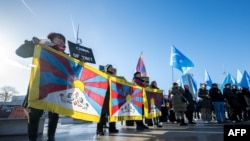China’s human rights record faced rare public scrutiny at the U.N. Human Rights Council in Geneva last week, and while Beijing was able to lobby some countries from the Global South to praise human rights conditions in the country, analysts and advocates say its charm offensive has had a limited effect.
“A lot of governments issued friendly recommendations to China during last week’s Universal Periodic Review [UPR] in Geneva, which demonstrated China’s influence, but despite the enormous pressure that many developing countries feel [from Beijing,] there were some bold statements from Latin American countries,” Raphael Viana David, China and Latin America Program Manager at the International Service for Human Rights [ISHR] told VOA by phone.
During the UPR, China’s fourth since the inception of the mechanism in 2008, a total of 161 UN member states commented on Beijing’s human rights record.
Several Western democracies urged China to ratify international treaties and cease human rights persecutions against ethnic minorities while countries from the Global South were split between those that praised the human rights conditions in China and others that expressed concerns about Beijing’s crackdown on civil society.
During the review, Costa Rica recommended China “remove excessive restrictions on the functioning of independent NGOs” while Belarus recommended China to “combat separatism and promote modernization of social governance system and capacity in Xizhang,” using the term that Beijing has adopted in its official English statement about Tibet.
During a regular news conference on January 24, Chinese Foreign Ministry spokesperson Wang Wenbin said Beijing follows a “people-centered approach” to human rights and works hard to “deliver a better life for the people.”
“During the review, China announced that it will adopt 30 new measures to safeguard human rights, covering areas of people’s wellbeing, legal protection for human rights, international cooperation on human rights, and the work related to UN human rights mechanisms,” Wang said.
Despite Beijing’s efforts to lobby support from developing countries, some expressed mixed views about China’s charm offensive.
“Before the UPR, China had sent something like instructions to [some of these] countries about what they should say to the other U.N. member states so that’s why some of them repeated the narrative that Beijing presented,” Rayhan Asat, a Uyghur human rights lawyer who engaged with diplomats from several countries prior to the review, told VOA by phone.
According to Asat, some countries in the Global South, including some in Africa, found China’s lobbying efforts quite “demeaning.” “They find China’s approach disrespectful to the U.N. process,” she said, adding that such sentiment didn’t stop these countries from echoing Beijing’s point of view.
Asat says it is difficult for countries to do that given the economic sway they maintain in their home capitals.
Prior to the review last Tuesday on January 23, several media outlets reported that China asked the U.N. to prevent some activists, whom Beijing characterized as “anti-China separatists,” from attending the review.
Apart from these efforts, Viana David from ISHR told VOA that the Chinese government also tried to influence media reporting on the UPR in Global South countries and limit access to the review for NGO representatives.
“China brought a huge delegation and [while] NGO representatives arrived an hour and a half before the review to try to queue to enter the room, their strategy still closed some space for civil society participation in this UPR,” he said.
Responding to reports about China’s attempt to lobby support from non-western countries ahead of the UPR, Foreign Ministry spokesperson Wang said Beijing attaches “high importance” to the UPR and promised to participate in the review “with an open, candid attitude.” “[The Chinese government] will communicate with all parties for mutual learning and joint progress,” he said during a daily press conference on January 23.
Some analysts say Beijing’s efforts to influence the human rights review reveal the fundamental problem of the mechanism. “The UPR is still very much an exercise of diplomatic struggle,” Patrick Poon, a visiting researcher at the University of Tokyo, told VOA by phone.
Poon, who participated in the U.N. Human Rights Council’s first review of China in 2009, said last week’s UPR shows that the review isn’t based on independent experts’ assessment of the human rights situation in China. “The UPR shows how eager China was at influencing other member states in the process but we can’t let China feel they can just get around this mechanism so easily,” he added.
Following last Tuesday’s session, the U.N. Human Rights Council’s UPR Working Group adopted the recommendations for China made by U.N. member states on January 26. China’s top diplomat in Geneva Chen Xu said Beijing would be ready to work with the global community to “steadfastly advance and safeguard human rights.”
Viana David from ISHR said the next step is to see how many recommendations will be accepted by Beijing between now and the next session of the UN Human Rights Council in June. “The document that shows which recommendations China accepts will be the test of Beijing’s willingness to commit to addressing [human rights] challenges,” he told VOA.
In his view, the way that the Chinese government responds to the recommendations made by U.N. member states will show whether China is serious about being a constructive international player. “This UPR will show us how much China is willing to be a constructive player in a geopolitical context where China seeks to assert itself as a responsible leader,” Viana David said.






